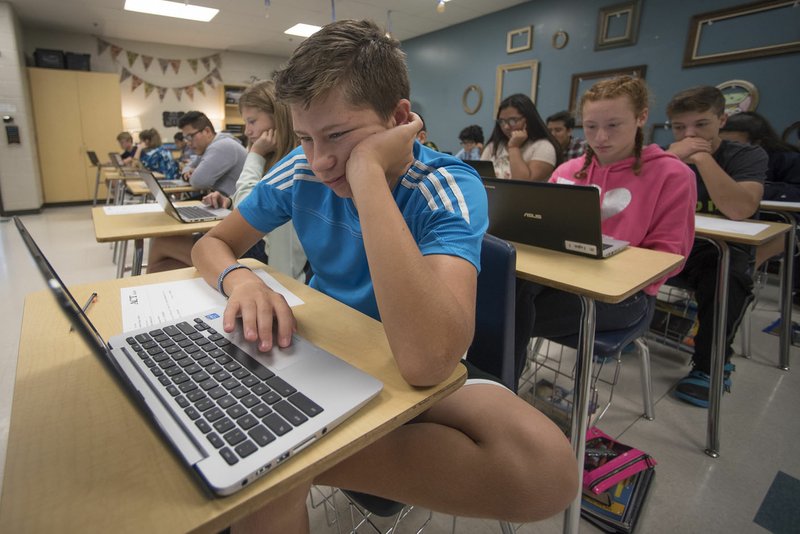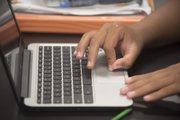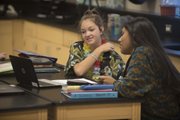Drop in on a classroom at Kirksey Middle School in Rogers, and chances are good you'll find students working on Chromebook computers.
Kirksey, like many schools across Northwest Arkansas, has invested heavily in technology over the past several years, especially portable electronic devices like Chromebooks.
Digital learning
Project Tomorrow, a nonprofit organization, published results in May of a survey of more than 500,000 K-12 students, parents and educators nationwide. Some of the findings:
• 86 percent of ninth- through 12th-graders, 72 percent of sixth- through eighth-graders and 46 percent of third- through fifth-graders are smartphone users.
• 47 percent of high schoolers use Twitter, up from 11 percent in 2011.
• 38 percent of students are finding online videos to help with their homework and 27 percent said they regularly watch videos created by their teachers.
• More than two-thirds of parents agree it’s important for students to use a laptop, tablet or Chromebook during the school day and 41 percent said they would buy a mobile device for their child to use in school — if the school allowed that.
Source: Staff report
Those devices are changing the way students learn and helping prepare them for the future, school officials said.
All schools in the Rogers School District have an electronic device-to-student ratio that's either close to or better than one-to-one. Kirksey, which enrolls about 950 students in grades six through eight, tops them all with 1.77 devices per student, according to numbers provided by Andy Mayes, the district's chief information officer.
Mel Ahart, Kirksey's principal, said no computer or software program can replace an effective teacher.
"But when you give an effective teacher really good tools, it makes them even better, and the students learn even more," Ahart said. "Our teachers are masters at implementing technology in the classroom with just the right amount that enhances the learning of the kids."
The school set a goal four years ago to have a set of Chromebooks in every classroom associated with a major subject area. Kirksey met that goal this year thanks in part to money awarded by the state for student achievement on state exams. Chromebooks are laptops that run on Google's Chrome operating system. They are designed primarily to run cloud-based applications. Schools are drawn to them because they are portable, durable and relatively inexpensive.
Kirksey teachers use Google Classroom, a platform through which they may share a variety of materials digitally with their students. Students who miss school can log into a teacher's Google classroom to catch up on work they missed. Ahart recalled one student who left on an international trip during last school year.
"We checked him out a Chromebook, and he did some of his lessons while he was outside the country. It works beautifully and can be used as a tool to really keep kids connect to school so whenever they come back, they're not so far behind," he said.
In general, however, the Chromebooks remain inside the classrooms and students do not take them home -- a practice of most schools.
Students were using their Chromebooks to answer an essay question on a recent morning in LaKeisha Newberry's eighth-grade English classroom at Kirksey. Newberry, while sitting at her desk, used her device to review her students' writing and even send comments to them, all in real time.
It's a more private way of communicating with students in class, which is good for those students who are shy about raising their hands, she said.
Andrea Hullett, an eighth-grade math teacher at Kirksey, said she's trying to get her students using the Chromebooks more in her class because the standardized tests they will take are on a computer.
"I can't let a kid score low on the ACT Aspire because they didn't know how to type in an equation," Hullett said.
Sarah McBride, 12, is a seventh-grader at Kirksey. She noted the Chromebooks save paper when, for example, teachers want students to read an article. Rather than print out the whole thing, they can just read it online.
"I love getting on the Chromebooks. There's something about it that's really fun," Sarah said.
Eighth-grader Joseph Navarro, 14, had little experience with computers before moving to Rogers from Texas two years ago. He likes using the computers so he can type rather than write.
"I'm able to keep up with my thoughts," he said.
The other big three school districts in Northwest Arkansas -- Bentonville, Fayetteville and Springdale -- also have stockpiled a lot of Chromebooks, laptops and tablets for student use.
Technology in Springdale classrooms has expanded rapidly since the district received a $25.88 million Race to the Top grant from the U.S. Department of Education in December 2013.
All Springdale students in grades kindergarten through second have iPad Minis. All students in grades three through 12 have Chromebooks, according to Rick Schaeffer, district spokesman.
The Bentonville School District's collection of computers has grown from about 1,200 to more than 12,000 over the past five years. Bentonville's 21st Century Technology initiative, which ran from 2012 through last year, awarded 96 grants to teachers, with each grant providing a classroom set of laptops or tablets.
The Fayetteville School District has more than 10,000 electronic devices for its students, equaling a ratio of better than 1 to 1.
"Today's students are coming from a background in technology," said Steven Weber, Fayetteville's associate superintendent for teaching and learning. "You see a 2-year-old in a grocery cart at the store playing with an iPhone. You go to the airport and see kids using a device while waiting for their plane."
The district is not abandoning textbooks, but encouraging students to use electronic devices when the situation or activity calls for it, Weber said.
In a 2014 survey of students, parents and educators by the nonprofit organization Project Tomorrow, teachers cited several benefits and challenges associated with learning with laptops and tablets.
Most teachers agreed student use of mobile devices increases student engagement and supports student ownership of the learning process. They also cited access to online textbooks as a benefit.
Sixty-eight percent of teachers expressed concern about equity issues -- that not all students have a device -- as a challenge for those teachers who don't have regular access to devices to use in their classrooms.
Teaching students how to use devices responsibly also was cited as a challenge. Lessons associated with digital citizenship must come into play in school, Kirksey Middle School administrators said.
"Devices are a part of these kids' reality, and I think it's part of our responsibility to teach them how to use these very powerful tools," said Sean Morris, assistant principal.
"And if they make mistakes, they're making mistakes in a safe environment where we can then teach them the right choices to make," Ahart said.
Ahart and Morris both said their students are handling the school's devices responsibly. They've also not experienced any thefts of the devices.
"We feel like, and our students have proven this to be true, if we let them be responsible, and put it back on them, they are technologically responsible and mature," Ahart said.
NW News on 10/17/2016


